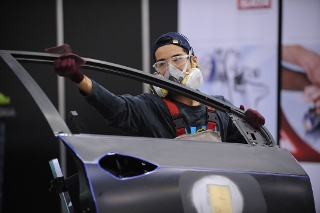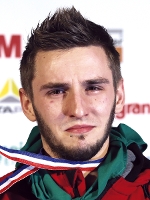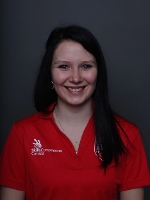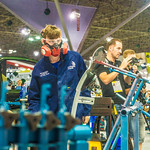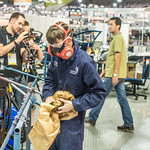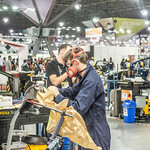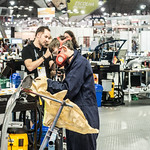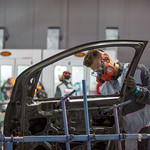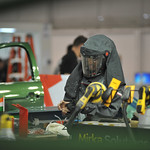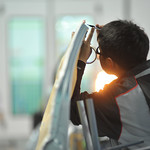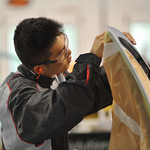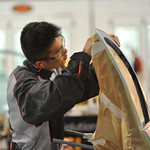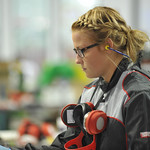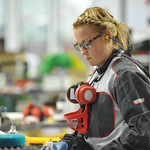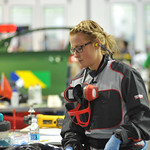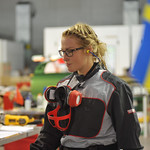Car Painting
Skill Explained
Car painters (refinishers) are responsible for reinstating the pre-accident paint finish to cars after the structure and/or the panels have been repaired or replaced. They may also be asked to completely repaint a whole vehicle either to change its colour or reinstate its newness. Car painters may also become involved in matching colours to an original colour no longer available or to colours that prove difficult to match. A car painter must match the colour, shade and texture of the adjoining panels that are not being painted.
Car painters can work in various work environments from an autobody repair shop to an aircraft hangar, dependent upon what vehicle or transport system they are painting. They work to apply paints inside an enclosed spray booth/oven in order to protect the environment from harmful products.
Car painters prepare panels or vehicles to receive paint. They may carry out minor panel repairs and apply undercoats, colour coats and clear sealant coats which provide the high gloss levels required. They may be required to identify a colour code using various methods, mix the correct amount of colour to pre-determined formulae and spray test cards to test the suitability of this colour match to the original colour and shade.
A Car painter needs to be aware of time schedules and may often be working on several vehicles at one time while waiting for previously applied materials to dry.
Car painters (refinishers) may be required to refinish a wide range of items such as passenger cars, racing cars, vintage and classic vehicles, commercial goods vehicles, trains, aeroplanes, static structures or furniture. They may be required to refinish a wide variety of materials such as metals, plastics, composite materials or wood.
What the Competitors do at the Competition
Competitors will be judged on the following activities
- Preparing, cleaning, and degreasing OEM surfaces including plastics, and fibreglass/composite materials.
- Masking areas not to be processed
- Bringing bodywork back to its original shape by filling and sanding
- Applying primer and filler or a mixture of both
- Sanding and masking
- Mixing the finishing paint, applying the correct colour formula; preparing a colour sample
- Sanding and polishing defects
- Applying decoration such as stripes, bands and shades
- Spraying of finishing paint;
- 2K solid colour acrylic urethane
- Clear over base metallic, pearl
- 2 and 3 layer pearl
- HS clear
- Waterborne base coats
- Special decorative paints such as chromaflare and tinted clearcoat
- Metal panels (bare, pre-painted or OEM)
- Plastic parts including fibreglass/composite materials
Competitors
Arifin Arifin
Indonesia
Åse Brekke Roe
Norway
Won Jun Cho
Korea
Andrey Deshevykh
Russia
Omar EL ATTAR
Spain
Brahim Ghaffour
Morocco
Frida Gustavsson
Sweden
Angela Jans
Switzerland
Maid Karasalihovic
Germany
Charles LESCLAUX
France
Lucas Luquianhuk
Brazil
Rabelani Malema
South Africa
Ryuhei Nomura
Japan
Kassandra Plante-Bilodeau
Canada
Mike Sørensen
Denmark
Luke Tahurangi
New Zealand
Blair Watters
Australia
Rebecca Wilson
United Kingdom
Jinlong Yang
China
Experts

Rachid ACHEHBOUNE
Morocco

Patrick Balmer
Switzerland

Rodney Bolton
United States of America

Camille Brinkemar
Sweden

Mariusz Dechnig
Germany

Brad Franklin
Australia

Nicolas GELOT
France

Jens Søndergaard Hansen
Denmark

Aaron Hebb
Canada

Roger Hiini
New Zealand

Young Kil Kim
Korea

PAI-FU LIN
Chinese Taipei

Alexander Misyurev
Russia

Tomás Morales
Brazil

Yukihide Murayama
Japan

Stuart Parmenter
South Africa

Jose Maria PEREZ DELGADO
Spain

Abdul Rahman
Indonesia

Sunil K Shukla
India

Adrian Statham
United Kingdom

Bjørn Erik Tveiten
Norway

Xiaopeng Zhang
China
Videos
A New Look at Skills
Autodesk Publisher 3D models*
Download for desktop
Download for mobile
Autodesk Inventor Data Sets**
* Open the 3D models on desktop with Autodesk Inventor Publisher. On mobile download the Autodesk Inventor Publisher Mobile Viewer app (iOS or Android).
** Students and Teachers can download Autodesk Inventor software via the Autodesk Student Community, Educational Institutions via Autodesk Academic Resource Centre (ARC).

